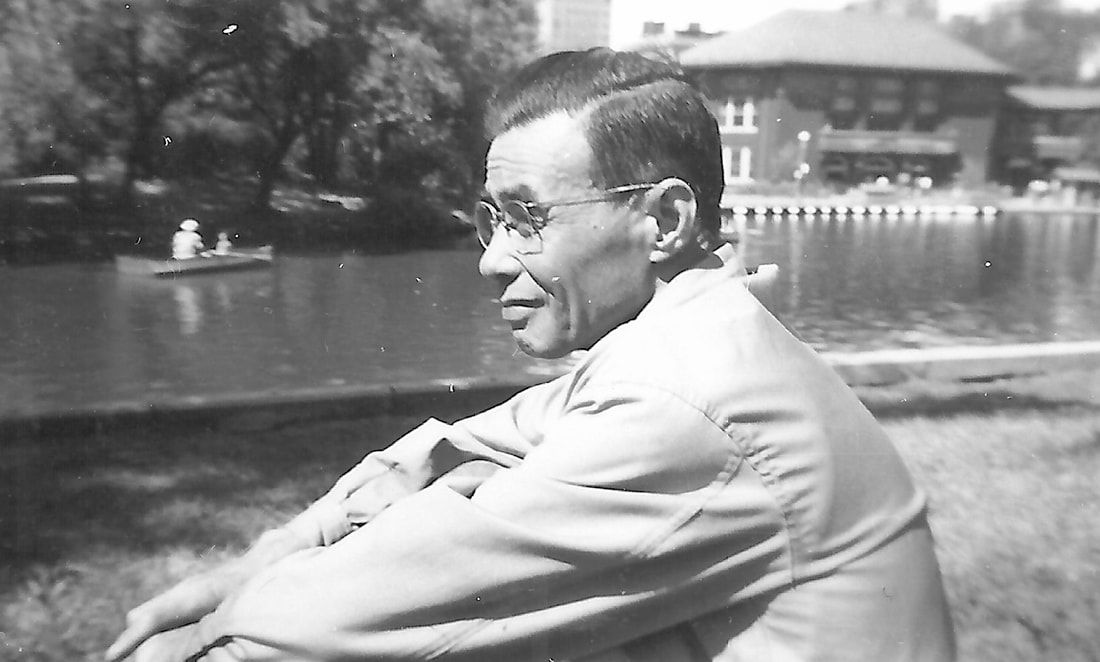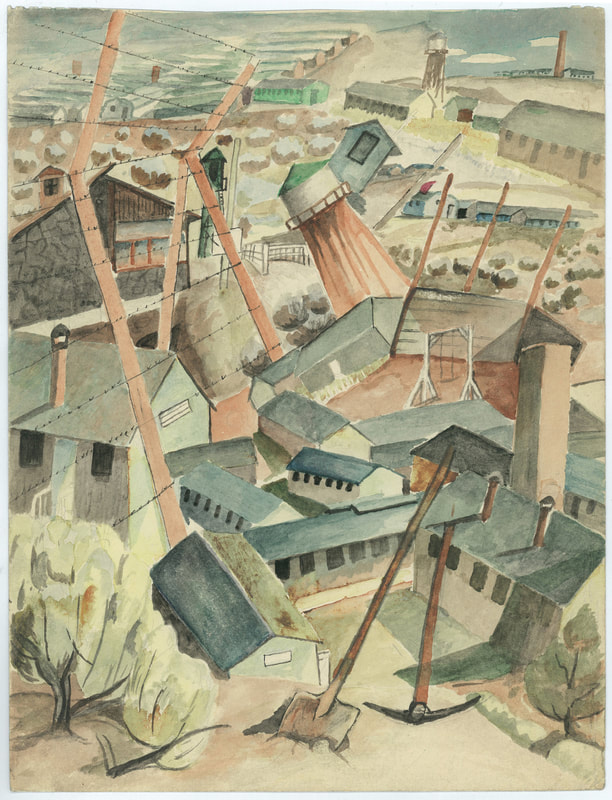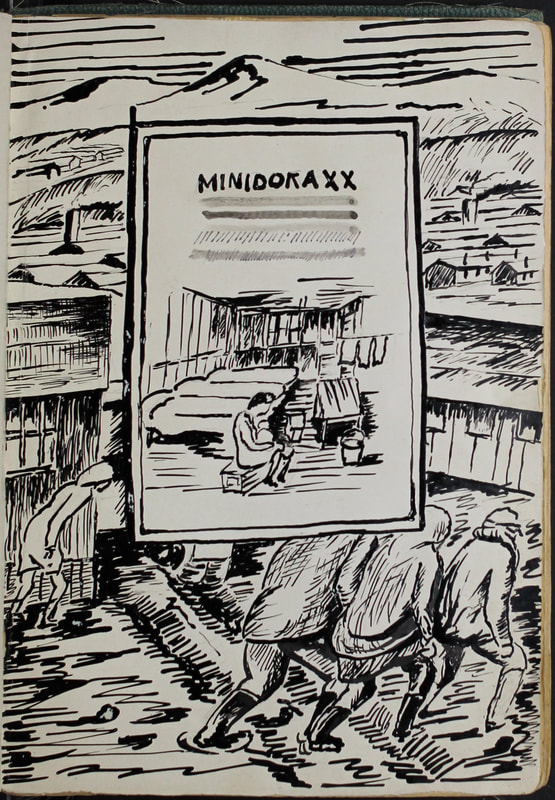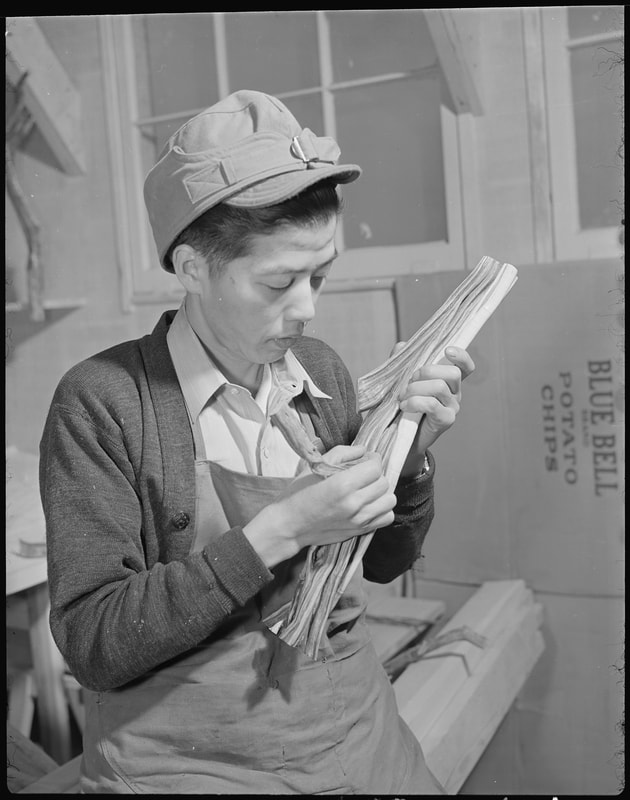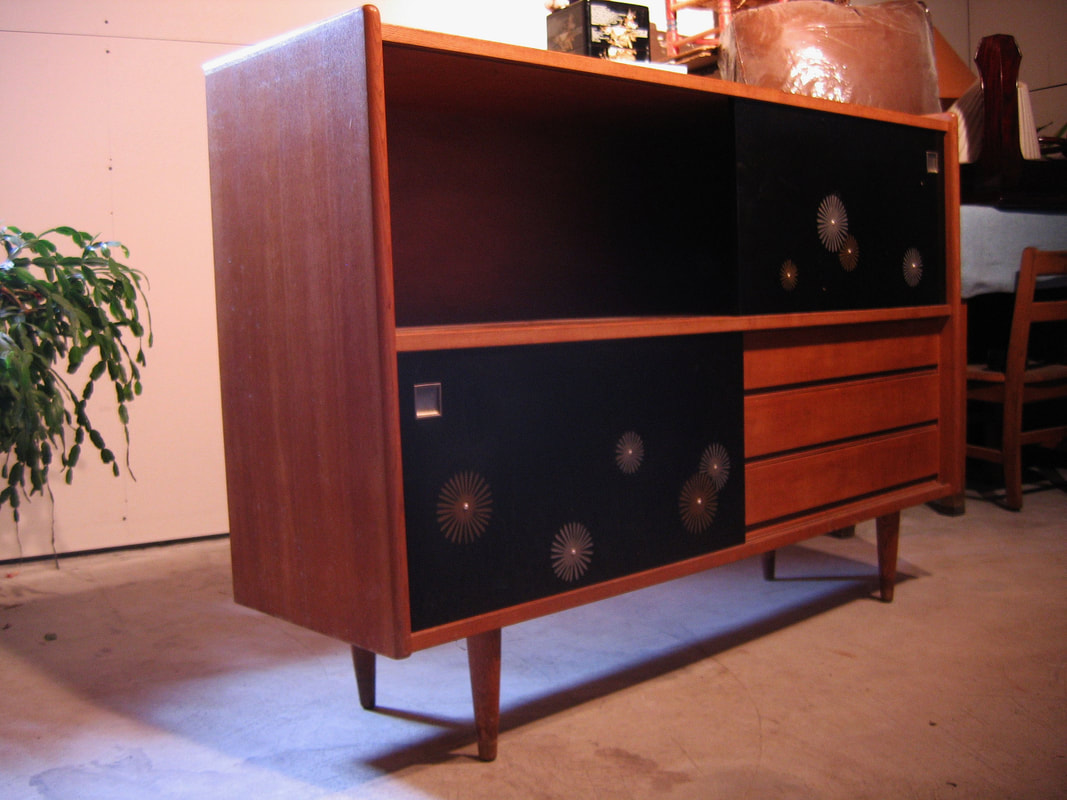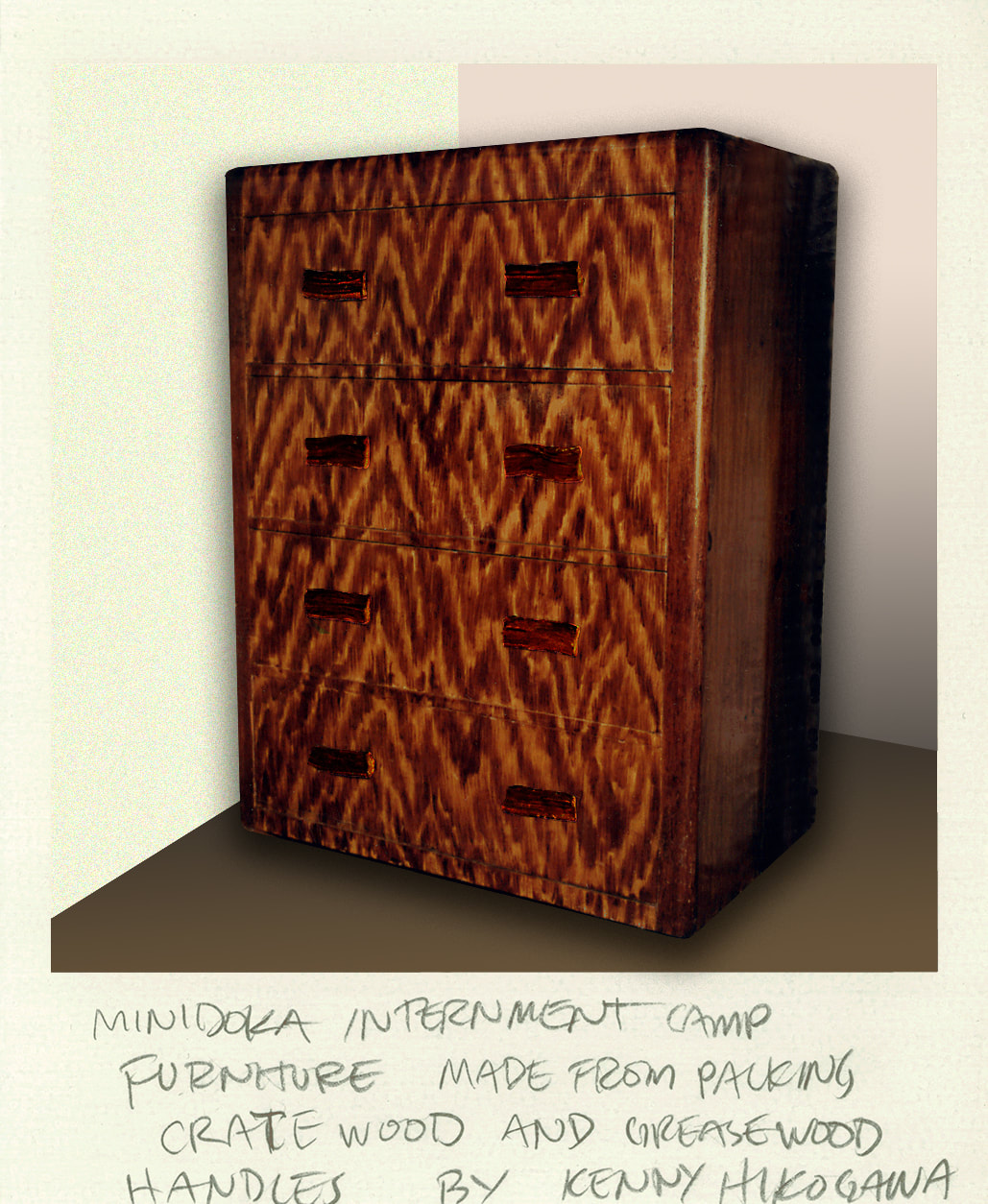MINIDOKA ART & FURNITURE
TAKUICHI FUJII
|
Photo of Takuichi Fujii ca. 1953
Courtesy of Sandy and Terry Kita. "Takuichi Fujii ca. 1953.." Densho Encyclopedia. 4 Aug 2017, 09:51 UTC. 17 Nov 2021, 17:32 <https://encyclopedia.densho.org/sources/en-tfujii-1/>. |
Fujii, his wife, and daughters, along with nearly all others of Japanese ancestry on the West Coast, were incarcerated during World War II. They were confined first at the Puyallup temporary detention site on the Washington State Fairgrounds thirty miles south of Seattle, and in August 1942, sent to the Minidoka incarceration camp in Idaho. Their daughters left Minidoka on work release in 1943, while Fujii and his wife remained there until the camp's closing in October 1945.
Sometime in May 1942, Fujii began an illustrated diary, which eventually reached nearly four hundred pages that span the family's forced removal from Seattle to the closing of Minidoka. Each ink drawing except the final few is accompanied by text, typically a brief caption identifying a place or event, and elsewhere, a distilled and evocative meditation. Step by step in the opening pages, Fujii describes in spare terms his move from freedom to incarceration. The diary is replete with images of the barbed wire fence, armed soldiers, and watchtowers as he methodically surveys Puyallup and then Minidoka. He pictures the daily routine, kinds of work and leisure activities, but the fact of confinement predominates. Throughout the diary, Fujii declares himself a witness as he describes his viewpoint in surveying the grounds at Puyallup and Minidoka and pictures himself sketching in public view. In chronological scope alone, it may be the most extended visual documentation of the incarceration. Courtesy of Barbara Johns, Densho |
Minidoka, montage with barbed-wire fence
Maker Fujii, Takuichi
Medium watercolor, paper
Dimensions H: 11.5 in, W: 9 in
Sandy and Terry Kita Collection
"Takuichi Fujii, Minidoka, montage with barbed-wire fence. Watercolor on paper, 11 1/2 x 9 in.." Densho Encyclopedia. 30 Nov 2017, 15:22 UTC. 17 Nov 2021, 17:35 <https://encyclopedia.densho.org/sources/en-tfujii-3/>.
Maker Fujii, Takuichi
Medium watercolor, paper
Dimensions H: 11.5 in, W: 9 in
Sandy and Terry Kita Collection
"Takuichi Fujii, Minidoka, montage with barbed-wire fence. Watercolor on paper, 11 1/2 x 9 in.." Densho Encyclopedia. 30 Nov 2017, 15:22 UTC. 17 Nov 2021, 17:35 <https://encyclopedia.densho.org/sources/en-tfujii-3/>.
Minidoka (title page of diary)
Maker Fujii, Takuichi
Date 1942-1945
Medium ink, paper
Dimensions H: 8.5 in, W: 5.5 in
Cover of illustrated diary Takuichi Fujii created to chronicle his family’s experiences from Puyallup detention center to Minidoka concentration camp.
Sandy and Terry Kita Collection
"Takuichi Fujii, title page of diary, 1942-1945. Ink on paper, 8 x 5 1/2 in.." Densho Encyclopedia. 30 Nov 2017, 15:29 UTC. 17 Nov 2021, 17:33. <https://encyclopedia.densho.org/sources/en-tfujii-2/>
Maker Fujii, Takuichi
Date 1942-1945
Medium ink, paper
Dimensions H: 8.5 in, W: 5.5 in
Cover of illustrated diary Takuichi Fujii created to chronicle his family’s experiences from Puyallup detention center to Minidoka concentration camp.
Sandy and Terry Kita Collection
"Takuichi Fujii, title page of diary, 1942-1945. Ink on paper, 8 x 5 1/2 in.." Densho Encyclopedia. 30 Nov 2017, 15:29 UTC. 17 Nov 2021, 17:33. <https://encyclopedia.densho.org/sources/en-tfujii-2/>
GENTARO KENNETH HIKOGAWA
|
Minidoka concentration camp. G. Kenneth Hikogawa. Polishing “grease-wood” to make furniture.
10/31/1942 Stewart, Francis Leroy, 1909-1992, Photographer National Archives Identifier: 536584 Local Identifier: 210-G-A780 |
Born: April 3 1902
Died: August 3 1963 Birth Location: Shikoku Island, Japan Building furniture was an immediate need and a risky challenge for imprisoned families, as materials had to be scavenged or surreptitiously taken from guarded government stockpiles. Nails had to be pulled from old crates and straightened for reuse or found in the detritus of the hastily built barracks. [2] It is a credit to Hikogawa's mastery that he built sturdy, aesthetically pleasing furniture from packing crate wood and native scrub trees. The only evidence of his work during this time is a photo of a chest with handles made of greasewood, a native shrub of Idaho. This fits with his WRA portrait in which he is working a piece of this wood. And while there is no evidence to support a direct correlation, it is interesting to note the parallel between Nakashima's trademark use of a board's natural edges and the handles of Hikogawa's chest of drawers. Nakashima spoke appreciatively of his "apprenticeship" with Hikogawa, stating in a 1979 interview with Fine Woodworking, "The time was not entirely lost. There was wood, and a very fine Japanese carpenter, so I became his designer and his apprentice at the same time."[3] It was during the year of their incarceration together that Hikogawa shared his mastery of carpentry, specifically his reverence for trees, the use of Japanese hand tools and the traditional methods of joinery. Courtesy of David Lane, Densho |
Cabinet with sliding panels
Maker Hikogawa, Kenneth
Date postwar
Medium plywood, pine
Cabinet with sliding panels made by Kenneth Hikogawa. Includes three drawers and two lacquered, stenciled sliding panels.
"Cabinet with sliding panels made from plywood and pine. Includes three drawers and two lacquered and stenciled sliding panels. Postwar.." Densho Encyclopedia. 18 Nov 2020, 21:04 UTC. 7 Feb 2022, 16:10 <https://encyclopedia.densho.org/sources/en-hikogawa-5/>.
Maker Hikogawa, Kenneth
Date postwar
Medium plywood, pine
Cabinet with sliding panels made by Kenneth Hikogawa. Includes three drawers and two lacquered, stenciled sliding panels.
"Cabinet with sliding panels made from plywood and pine. Includes three drawers and two lacquered and stenciled sliding panels. Postwar.." Densho Encyclopedia. 18 Nov 2020, 21:04 UTC. 7 Feb 2022, 16:10 <https://encyclopedia.densho.org/sources/en-hikogawa-5/>.
Chest of drawers
Maker Hikogawa, Gentaro Kenneth
Date 1942-1945
Medium packing crate wood, greasewood handles
Chest of drawers made by Gentaro Kenneth Hikogawa using packing crate wood and greasewood handles in Minidoka concentration camp, Idaho.
"Chest of drawers made from packing crate wood and greasewood handles by Kenny Hikogawa, Minidoka concentration camp, Idaho.." Densho Encyclopedia. 18 Nov 2020, 21:04 UTC. 7 Feb 2022, 16:22 <https://encyclopedia.densho.org/sources/en-hikogawa-4/>.
Maker Hikogawa, Gentaro Kenneth
Date 1942-1945
Medium packing crate wood, greasewood handles
Chest of drawers made by Gentaro Kenneth Hikogawa using packing crate wood and greasewood handles in Minidoka concentration camp, Idaho.
"Chest of drawers made from packing crate wood and greasewood handles by Kenny Hikogawa, Minidoka concentration camp, Idaho.." Densho Encyclopedia. 18 Nov 2020, 21:04 UTC. 7 Feb 2022, 16:22 <https://encyclopedia.densho.org/sources/en-hikogawa-4/>.
Special thanks to:
Densho
Alvin Takamori, GVJCI Day of Remembrance committee member
Densho
Alvin Takamori, GVJCI Day of Remembrance committee member


